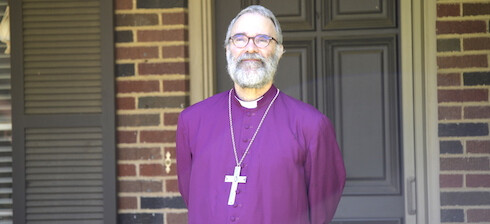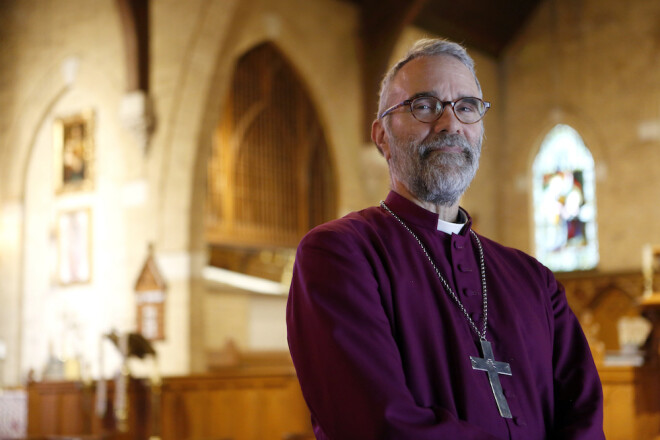A Pastoral Letter on What’s Next

Good Shepherd Sunday
Dear Brothers and Sisters,
Greetings in Christ. Thanks for your participation in the ‘What’s Next’ Clergy Zoom Week. I have also had a chance to consult with our medical group and the Standing Committee. I have listened to the opinions expressed by all and now set out the path forward in this letter.
- General principles. We must be guided by science and data. We will be cautious, aiming to be behind the descending curve as we were ahead of the ascending one. The virus has no political party, and we aim to make decisions to combat it in a similarly neutral way. We want to be in sync whenever possible with the authorities and fellow Churches. We have one policy for the diocese. Our real polestar is the tradition of Christian theology and spirituality we have inherited; I have sought to give articulation to this in my reflection called ‘Communion in the Midst of Disaster,’ which I am sending along with this letter.
- The elderly and vulnerable. Both epidemiological and governmental sources agree that these groups should remain sheltered in the reopening of society. We therefore earnestly advise that Episcopalians in these groups continue for the foreseeable future to remain at home even as they participate in our common life in alternative ways. We will therefore need to continue to offer online Sunday services throughout to serve those who cannot attend in person.
- There is no obligation to do the things permitted on the dates I will mention There is no requirement to celebrate the Eucharist under the strictures we have imposed. Morning Prayer and a Sermon are fully acceptable, as would be a continuation of only live-streamed Eucharist, without a congregation. You must use your judgment to determine the best liturgical practice for your congregation; whatever you decide should be safe, realistic, devout, and sustainable. The priest in charge can make this call. I hope my theological statement gives a context in which all of these decisions can find a ready justification.
- Steps and timing. We will reopen services for public participation in steps. --Step A involves a safe way to distribute communion outside of the service itself.
-Step B involves permitting gatherings of up to 10 total.
-Step C involves permitting gatherings of however many people may be included while all congregants are socially distanced by six feet.[1] You must figure this out in advance by measuring your church space with tape measure in hand before taking this step!
Test these assumptions: a pew can include two individuals or one family- you can use every third pew. Please report this maximum. (You must also have a plan for getting people in and out safely).
Government advice at both the federal and local levels has said that two weeks of declining infection rates should precede re-opening (not to mention massive testing!) Different counties are in different statistical situations vis-à-vis this requirement.
All Churches may move to Step A as of Rogation Sunday (May 17).
Churches outside of Dallas, Denton, and Collin Counties may move to Step B as of Rogation Sunday (May 17); let Dean Price, Bishop Smith or me know if you wish to.
We are keeping an eye on how things develop and will notify you in advance before anyone can move on to Step C.
- Distributing communion safely. If, according to Step A, you wish to bring communion to shut-ins (and this category will probably now include a larger number of members), it must be done safely. This might happen in a ‘drive in’ manner, or by leaving communion on a porch after making arrangements, or in another way. But in all cases this should be done in keeping with safety standards (found in 8). See attachment for our guiding protocol.
- Small groups. In Step B also one can easily imagine a two-track approach that continues with virtual groups while carefully allowing some small groups in person now as well. The important thing will be to plan ahead. Block out where people will sit or stand (perhaps with tape), make sure they are spaced. Reiterate the rules about non-contact, distance, etc. Think about how they will come and go, etc. Evaluate afterwards.
(We are obviously not ready to open our doors to other groups.)
(These same health rules apply whether the meeting is in the church or in a home).
- Larger in person gathering (Step C) must have protocols.How to reopen at first will be harder for larger churches. I know that some of our churches are planning to invite members to attend in a schedule, perhaps of last names. (This comment from Bishop Doyle of Texas’ protocol is worth considering: “Allow for friends and neighbors to be invited and attend the house meetings. In other words, leave room for evangelism and mission to take root.’)
-Each step toward return will be accompanied by its own restrictions, which may seem jarring. Eucharistic gathering must follow these protocols: a) congregants socially distanced b) in masks c) no tactile Peace, common cup, shaking hands at the door, or coffee hour d) communion from reserved sacrament, priest masked, communicants distanced and with sanitized hands, e) vigorous cleaning before and after each service. I will leave you free to figure out how to plan within these parameters; you will learn soon who and how many in the congregation actually want to attend. (Obviously have a cache of masks on hand at Church would be important, as well as hand sanitizer if you can).
-Whether to give communion out or not is a decision you can make. If you decide to do Morning Prayer as you gather, would need to need a), b), parts of c), and e).
- Let’s keep it simple. In all three steps, the advice of medical experts is the same: everyone must follow the rules we are accustomed to. Everyone distributing bread, leading, or attending, must wear a mask, have clean hands, and be socially distanced by at least 6 feet. This is not guidance or advice, this is a pastoral directive: clergy must observe these health rules, and enforce them for all in attendance. If someone doesn’t want to wear a mask, they shouldn’t attend in person. Explain that failing to observe these rules puts other members at risk. (Leaders may carefully remove their masks to be heard while preaching, reading, or celebrating, after which they should put them back on, during all of which they maintain their 6 feet of distance).
- Recent research shows that choristers can project the virus further than previously known. Singers should be separated as much as possible; the previously stated rule that each should be 10 feet from one another and all parishioners is a minimum. A single soloist is a good option.
- Pre-schools and daycares.There is no change to the policy at this time.
- I assume that each congregation will work this out for itself in its own context. But the pictures in the media of miles-long lines of cars in South Dallas seeking food are reminiscent of the Great Depression. We are creating a fund to support feeding programs in north Texas, will be contributing on your behalf, and encourage congregations to take part as well.
- I am continuing my ‘visitations’ by distance through Labor Day. I will send a pre-recorded sermon and greeting, with or without a taped celebration, as the priest wishes, all from my chapel.
In this season of ministry I want to emphasize teaching, which is after all a core calling of a bishop. Every Monday and Wednesday evening is open! I am ready to lead a youth or adult confirmation class, or do an adult ed session. Pick a topic or I can. Book it with Virginia.
- Weddings and funerals. The restrictions on funerals with respect to numbers attending and location continue. We can plan to memorial services for a time down the road. Marriages are possible so long as the norms of distance, numbers (10 or fewer) and non-contact (except for the kiss by the couple, who are a biome!) are strictly observed.
- Formation for new online visitors. We are planning an opportunity to think about and discuss resources to catechize people who have come anew to your church via Facebook or video services. You will hear more about this from Canon Hylden.
- Visiting hospitals and nursing homes. Several clergy have asked about this. The experts tell me that this is still a way off.
- Clergy house at Camp All Saints. This will be available in the fall if you would like to get away for a few days. First come first served. A fee for cleaning would be required.
- Clergy days. We will have a special day in the fall via Zoom to think about mission and evangelism in our present reality. In 2021 we will have an ‘home team’ clergy conference with scholars of our own. We don’t yet know where or how.
- This is a continually changing situation. Many experts predict a resurgence at some time, at which point we will need to pull back.
I continue to be grateful for each of your faithful and patient response to the past month and a half, and I continue to pray for you all.
Peace,
+GRS
[1]Earlier government documents used the threshold of 50, while the Governor has said 25% capacity. These may in many cases prove fairly close to the capacity you ascertain by measuring.




